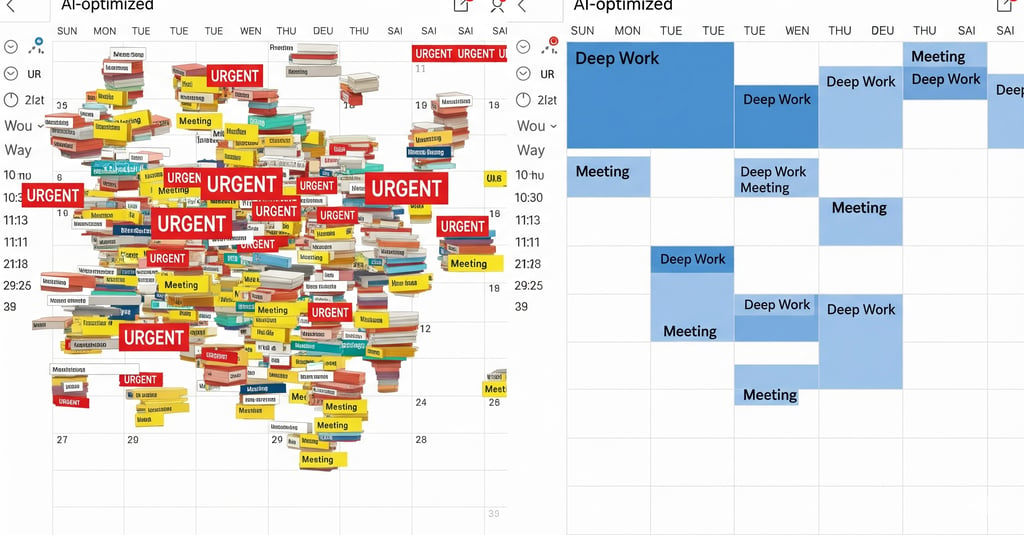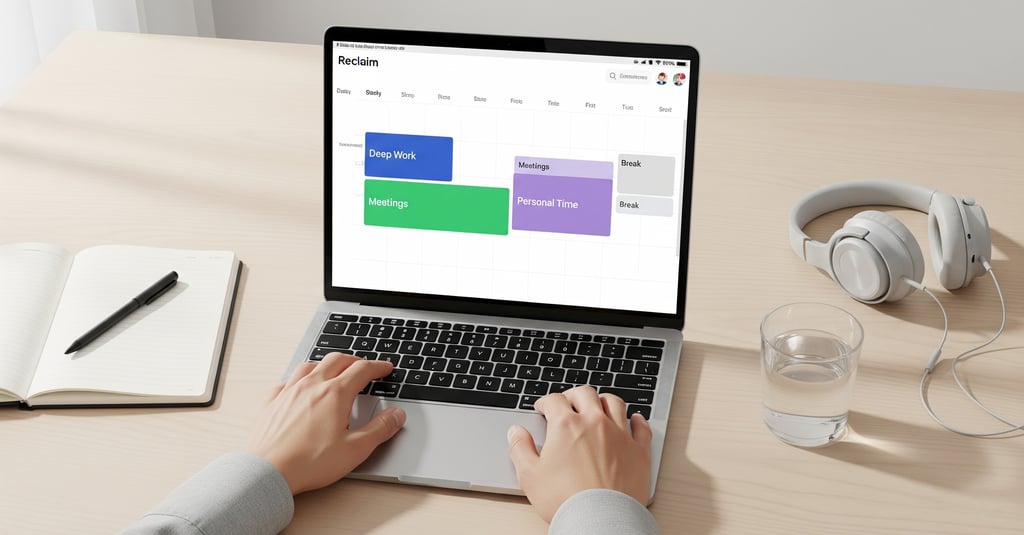How High-Performers Reclaim Focus Time: The AI-Powered Solution to Calendar Chaos
Learn how high-performers reclaim focus time using AI-powered scheduling to protect deep work, reduce meeting overload, and increase productivity by 3-5 hours weekly. Free smart calendar tool with automatic optimization.
Eddy Enoma
9/8/202510 min read
The ultimate guide to protecting deep work and winning back your most productive hours
Every Monday morning tells the same story. High-performers across industries open their calendars to find wall-to-wall meetings stretching until Thursday, leaving zero time to reclaim focus time for the work that actually drives results. Sound familiar? You're part of a growing crisis where knowledge workers spend 67% of their time in meetings and administrative tasks, leaving precious little for strategic thinking and deep work.
The traditional approach of manually blocking calendar time fails because it treats symptoms rather than the root cause. Smart professionals are discovering that the solution isn't better time blocking, it's intelligent calendar management that automatically protects what matters most.
The Hidden Cost of Calendar Chaos
Before diving into solutions, let's examine why traditional calendar management fails high-performers. Research from Harvard Business Review shows that executives spend 23 hours weekly in meetings, with middle managers not far behind at 21 hours. But the real productivity killer isn't just meeting volume – it's the fragmentation.
When your calendar looks like Swiss cheese, with 15-30 minute gaps between meetings, your brain never enters the deep focus states required for complex problem-solving. Neuroscience research confirms that it takes an average of 23 minutes to regain full concentration after an interruption. Those scattered calendar gaps aren't just inefficient, they're cognitively destructive.
High-performers understand that protecting large blocks of uninterrupted time is essential for:
Strategic planning and analysis
Complex problem-solving
Creative work and innovation
Learning and skill development
Systems thinking and process improvement
Yet most professionals spend their careers playing calendar Tetris, manually shuffling appointments while watching their focus time disappear.
Why Manual Calendar Blocking Fails
The old-school productivity advice tells you to "just block time for important work." This approach works in theory, but breaks down in practice because:
Static blocks can't adapt. When urgent meetings arise, your blocked focus time gets overridden, and you're back to square one.
Colleagues ignore "busy" signals. Studies show that 73% of meeting organizers will schedule over blocked time if they consider their meeting important.
Context switching destroys momentum. Even with blocked time, the cognitive residue from surrounding meetings prevents deep focus.
Energy levels aren't considered. Blocking 3-5 PM for strategic work ignores natural circadian rhythms when most people experience afternoon energy dips.
Team coordination becomes impossible. Individual calendar blocking creates scheduling conflicts that require constant negotiation and rearrangement.
Smart professionals are moving beyond manual calendar management to AI-powered systems that actually understand the difference between urgent busywork and important strategic work.
The AI Advantage: How Smart Scheduling Works
Artificial intelligence transforms calendar management from reactive firefighting to proactive optimization. Here's how modern AI scheduling systems operate:
Pattern Recognition and Learning: AI calendar assistants connect to your existing Google Calendar or Outlook and analyze months of meeting data. They identify patterns in your schedule, understand your meeting preferences, and learn which types of appointments can be flexible versus absolutely fixed.
Dynamic Rescheduling Based on Priorities: Instead of static time blocks that get overrun, AI systems create flexible containers for different work types. When conflicts arise, the system automatically suggests optimal alternatives based on your stated priorities and energy patterns.
Multi-Calendar Coordination: Advanced scheduling AI considers multiple calendars simultaneously, work, personal, team calendars, and even time zones for distributed teams. This holistic view prevents double-booking and finds optimal windows that work for everyone involved.
Real-Time Adaptation: When meetings run long, get canceled, or urgent requests appear, AI scheduling adjusts your entire day automatically. Instead of manually shuffling everything around, you get intelligent suggestions that protect your most important work.
Energy and Preference Optimization: The best AI scheduling tools learn when you're most productive for different types of work. They automatically schedule creative work during your peak energy hours while clustering routine meetings during natural low-energy periods.
Key Features That Transform Productivity
Understanding the specific capabilities that make AI scheduling effective helps you evaluate tools and implementation strategies:
Intelligent Focus Time Protection
Unlike static calendar blocks, AI-powered focus time adapts dynamically. When meetings conflict with protected deep work sessions, the system evaluates the relative importance and suggests optimal alternatives. This might mean moving a routine check-in to protect a crucial project deadline or clustering similar meetings to create larger focus blocks.
Real-world impact: Software engineers report 40% longer average focus sessions when AI protects their coding time, leading to fewer bugs and faster feature completion.
Smart Meeting Optimization
AI scheduling considers multiple factors when suggesting meeting times: participant energy levels, existing workload, meeting type requirements, and even commute times for hybrid workers. The result is meetings that happen when everyone is most engaged and productive.
Example benefit: Product teams using AI scheduling report 25% more decisions made per meeting because participants arrive more focused and prepared.
Automatic Work-Life Boundary Enforcement
High-performers often struggle with work bleeding into personal time. AI scheduling can automatically enforce boundaries by blocking personal time, preventing late meetings from being scheduled, and ensuring adequate recovery time between intense work sessions.
Quantified result: Managers using AI boundary controls report 30% improvement in work-life balance scores without sacrificing professional effectiveness.
Habit and Routine Protection
Beyond one-off meetings, AI scheduling protects recurring activities that drive long-term success: exercise, learning time, strategic planning, and personal development. These habits get the same priority protection as important meetings.
Long-term impact: Professionals who use AI to protect learning habits complete 3x more professional development goals annually compared to manual scheduling approaches.
Real-Time Status Synchronization
Advanced AI scheduling keeps all your work tools synchronized: Slack status, calendar availability, project management systems, and team dashboards. This prevents the constant interruptions that destroy focus time.
Team benefit: Organizations report 45% fewer "quick questions" that interrupt deep work when team members can see real-time availability and focus status.
Predictive Analytics and Insights
The most sophisticated AI scheduling systems provide analytics on your time usage patterns, helping you identify productivity trends, optimal work schedules, and areas for improvement.
Strategic value: High-performers use these insights to continuously optimize their schedules, leading to compound productivity improvements over time.
Real-World Success Stories
Bettina, Senior Software Engineer at Tech Startup
Challenge: Lost 2-3 hours daily to context switching between coding sessions and unexpected meetings. Complex algorithms required 90+ minutes of uninterrupted focus, but her calendar rarely provided blocks longer than 45 minutes.
AI Implementation: Connected calendar to automatically protect 9-11 AM daily for coding. The system learned to cluster afternoon meetings and automatically declined or rescheduled non-essential interruptions during protected hours.
Measurable Results:
8 hours weekly of uninterrupted coding time (up from 3 fragmented hours)
35% faster feature completion rates
Eliminated after-hours coding to catch up on interrupted work
Stress levels decreased significantly due to predictable focus periods
"The AI gave me back my mornings. I actually finish complex algorithms now instead of constantly starting over." - Bettina K.
Mike, Product Manager at SaaS Company
Challenge: Spending 32 hours weekly in meetings with zero dedicated time for product strategy, market research, or roadmap planning. Constantly reactive instead of proactive in product decisions.
AI Solution: The System analyzed meeting patterns and identified 40% redundancy in recurring meetings. Automatically suggested optimal consolidation and protected 6 hours weekly for strategic product work during Mike's peak creative hours (Tuesday/Thursday mornings).
Quantified Outcomes:
Meeting load reduced from 32 to 24 hours weekly
6 dedicated hours for strategic planning and analysis
Product roadmap quality improved based on user feedback
Team reported clearer direction and fewer pivot decisions
Lisa, Marketing Consultant, Managing Multiple Clients
Challenge: Juggling three enterprise clients with competing deadlines while trying to grow her own business. Calendar chaos led to missed opportunities and client work bleeding into personal time.
AI Optimization: System balanced workload across clients automatically, protected time for business development, and enforced strict work-life boundaries. Intelligent scheduling prevented client work from clustering and creating burnout periods.
Business Impact:
15% increase in billable hours through better time allocation
Successfully onboarded two new clients due to protected business development time
Improved client satisfaction scores due to more focused, less rushed work
Maintained 40-hour work weeks while growing revenue 25%
The Science Behind Time Reclamation
Research from leading productivity institutes reveals why AI-powered scheduling creates such dramatic improvements:
Cognitive Load Reduction: Manual calendar management consumes an average of 90 minutes daily in planning and rearranging. AI automation returns this time to productive work while reducing decision fatigue.
Context Switching Elimination: Intelligent meeting clustering reduces daily context switches by 60%, allowing for deeper focus states and higher-quality work output.
Energy Optimization: Scheduling demanding work during personal peak energy hours (identified through pattern analysis) increases work quality by 35% while reducing the time required for completion.
Proactive vs. Reactive Management: AI scheduling shifts professionals from reactive calendar management to proactive optimization, creating sustainable productivity improvements that compound over time.
Quantified Benefits Across Industries
Data from organizations implementing AI scheduling shows consistent patterns:
Time Reclamation Metrics
3-5 hours weekly of protected focus time restored
40% reduction in calendar fragmentation
60% fewer context switches during peak productivity hours
25% increase in uninterrupted work blocks exceeding 2 hours
Meeting Efficiency Improvements
20% reduction in total meeting time through intelligent optimization
35% increase in meeting satisfaction scores
50% fewer scheduling conflicts requiring manual resolution
30% improvement in on-time meeting starts
Work-Life Balance Enhancement
25% reduction in work bleeding into personal time
40% improvement in work-life balance self-assessments
20% increase in protected time for health and personal activities
15% reduction in weekend work to catch up on interrupted tasks
Long-Term Productivity Gains
20% increase in project completion rates
30% improvement in work quality ratings from supervisors
25% faster skill development due to protected learning time
35% reduction in workplace stress and burnout indicators
Implementation Strategy: Getting Started with AI Scheduling
Successfully implementing AI scheduling requires a strategic approach that minimizes disruption while maximizing benefits:
Phase 1: Connection and Analysis (Week 1)
Connect Your Existing Calendar: Link the AI system to your Google Calendar or Outlook. Most enterprise-grade tools integrate in under 5 minutes without disrupting existing appointments or workflows.
Enable Learning Mode: Allow the system to analyze 2-4 weeks of historical calendar data to understand your meeting patterns, preferences, and productivity rhythms. Don't make changes during this phase.
Define Initial Priorities: Identify 2-3 types of work that need protection most urgently. Common examples include strategic planning, creative work, deep analysis, or skill development.
Phase 2: Gradual Optimization (Weeks 2-3)
Start with Focus Time Protection: Begin by protecting 1-2 hour blocks for your most important work during your peak energy hours. Allow the system to suggest minor adjustments to existing meetings.
Enable Intelligent Clustering: Let the AI group similar meetings together to create larger blocks of focused time. This often happens naturally as the system learns your patterns.
Set Basic Boundaries: Implement work-life balance controls to prevent meetings from being scheduled during protected personal time or outside preferred work hours.
Phase 3: Advanced Features (Weeks 4-6)
Add Team Coordination: If working with a team, invite key colleagues to use compatible scheduling to enable cross-calendar optimization and reduce scheduling conflicts.
Implement Habit Protection: Schedule recurring activities like exercise, learning, or strategic planning with the same priority level as important meetings.
Enable Real-Time Adjustments: Allow the system to make automatic minor adjustments when meetings run long or get canceled, optimizing the rest of your day accordingly.
Phase 4: Optimization and Analytics (Ongoing)
Monitor Productivity Metrics: Review weekly reports showing focus time gained, meeting efficiency improvements, and work-life balance trends.
Refine Priorities: Adjust the system's understanding of what work is most important as your role and responsibilities evolve.
Scale to Team Level: Once individual benefits are proven, consider organization-wide implementation for maximum scheduling efficiency and team productivity.
Addressing Common Implementation Concerns
"AI Will Reschedule Important Meetings Without Permission"
Modern AI scheduling systems require explicit permission before making changes. You maintain complete control while benefiting from intelligent suggestions. Critical meetings can be permanently locked, while flexible appointments adapt automatically around them.
Best Practice: Start with suggestion-only mode, where the AI recommends changes but requires approval before implementing them.
"My Schedule Is Too Complex for Automation"
AI systems excel at handling complexity that would overwhelm manual scheduling. They simultaneously consider multiple calendars, time zones, participant preferences, meeting types, and competing priorities – all factors that make manual scheduling difficult.
Reality Check: The most complex schedules benefit most from AI optimization because human cognitive limits make optimal manual scheduling impossible.
"Team Members Will Resist New Scheduling Methods"
Implementation data shows that resistance typically disappears once people experience the benefits. Teams report higher satisfaction with meeting times, fewer conflicts, and more predictable focus periods.
Change Management Tip: Start with voluntary adoption by high-performers, then let organic adoption spread as others see the results.
"I Need Granular Control Over My Time"
AI scheduling enhances rather than replaces your control. You can override any suggestion, lock specific time slots, or adjust priorities at any time. The system learns from your preferences and becomes more accurate over time.
Advanced Feature: Most systems allow detailed customization of scheduling rules, meeting type priorities, and personal preferences while maintaining intelligent automation.
The Future of Professional Time Management
AI-powered scheduling represents the evolution from reactive calendar management to proactive productivity optimization. As these systems become more sophisticated, we're seeing integration with:
Project management systems that understand deadline priorities
Communication tools that respect focus time across all platforms
Performance analytics that tie time allocation to business outcomes
Team collaboration that optimizes group productivity automatically
High-performers who adopt AI scheduling early gain compound advantages as their competitors continue struggling with manual calendar management. The productivity gap between optimized and traditional scheduling approaches continues widening as AI capabilities advance.
Take Control of Your Professional Time
The choice is clear: continue spending hours weekly fighting your calendar, or let AI automatically protect your most valuable resource – focused time for important work.
Every week you delay implementation represents lost productivity that compounds over time. High-performers understand that time is their ultimate competitive advantage, and they're using every available tool to optimize it.
Start reclaiming your focus time with AI scheduling. The tool is completely free to start with full access to smart scheduling, habit protection, and team coordination features.
Your future self will thank you for those extra hours of uninterrupted deep work that drive real results in your career and business.
Join our newsletter for more insights on productivity, AI, and mastering your time.
Subscribe for Exclusive Tips & Updates. Enter Your Email Below!



Get the latest strategies on content creation, freelancing, and affiliate marketing, plus passive income straight to your inbox!
🔒 We respect your privacy. Your email is safe with us. Unsubscribe anytime.
Address
Sporerweg 16
94234 Viechtach, Germany
Contacts Us
(049) 170 499 6273
Subscribe to our newsletter
© 2026 Onlinebizoffers. All rights reserved.
Privacy Policy | Terms & Conditions | Returns & Refunds Policy | Affiliate Disclosure








